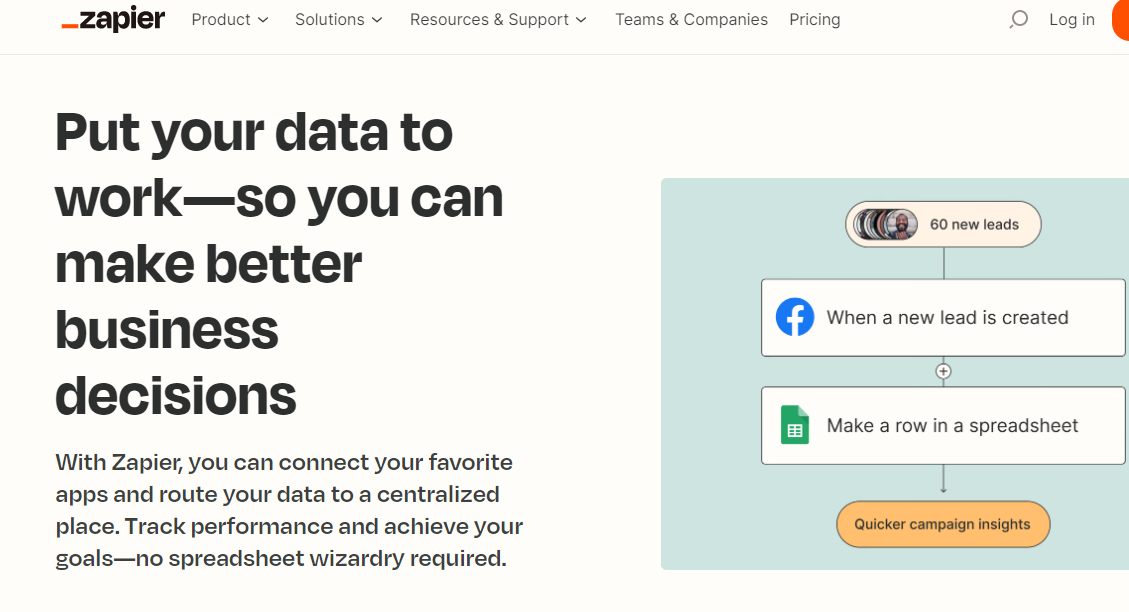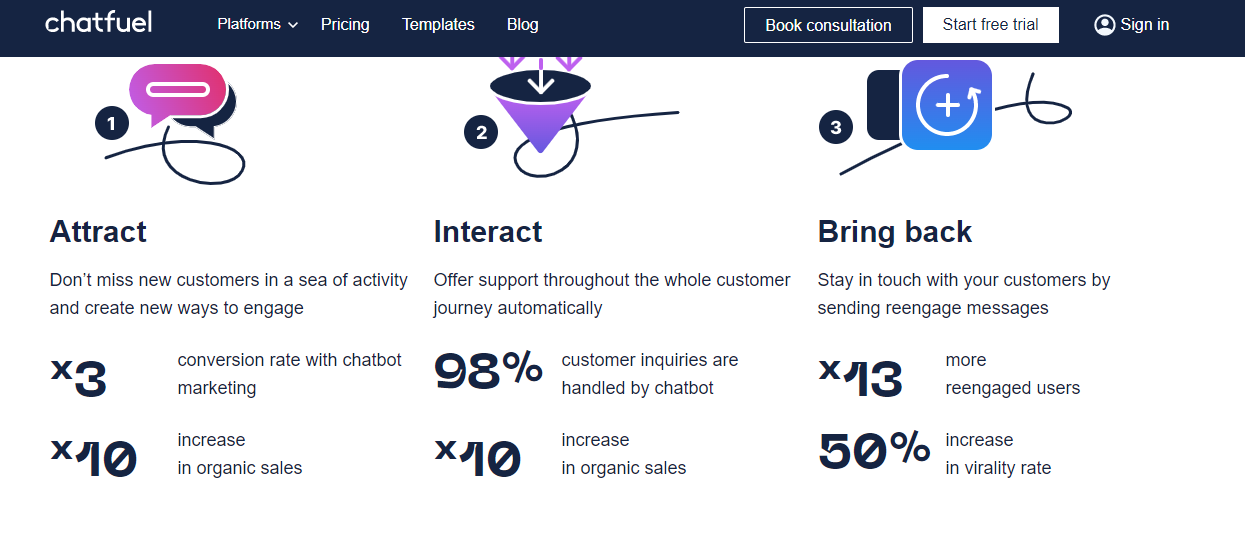In recent years, there’s been a lot of talk about artificial intelligence (AI) and its potential to revolutionize various industries, digital marketing included. While some marketers are still trying to wrap their heads around what AI is and how it can be used, others have already successfully started incorporating AI into their marketing strategies.
If you’re looking to get ahead of the competition, you need to start using AI in your marketing. But where do you even begin? Don’t worry, we’ve got you covered. In this guide, we’ll try to show you everything you need to know about using AI in marketing, including what it is, how it works, and some practical ways you can use it in your digital marketing campaign.
What Is AI Marketing?
AI marketing is a form of marketing that utilizes artificial intelligence to automate marketing tasks and drive better results. AI marketing software can help businesses with tasks like email marketing, customer segmentation, lead generation, and even personalization.
In other words, AI marketing aims to make the marketing process more efficient and effective by automating repetitive tasks and providing more accurate insights. While AI marketing is still in its beta stages, it has already shown promise as a powerful tool for businesses that are looking to stay ahead of the competition. AI marketing will likely become even more prevalent in the business world as technology evolves.
How Does It Work?
So how it really works ? In a nutshell, AI takes in large amounts of data and uses that data to train algorithms. These algorithms are then used to make predictions or decisions. The more data that is fed into the system, the more accurate the predictions or decisions will be.
AI systems are often compared to human brains. Just like our brains, AI systems learn by making connections between different pieces of information. However, unlike our brains, AI systems can process vast amounts of data much faster than we can. This allows them to make sense of patterns that would be too difficult for us to notice.Although it is never possible to beat the human brain, it can assist in the faster working process.
Use Cases of Artificial Intelligence in Marketing Strategy
Customer Support at Scale
Today, many businesses are using chatbots for customer support. Chatbots are software applications that can simulate human dialogue. They are used to help customers with common questions and tasks. Chatbots can be used on websites, apps, or social media platforms.
Chatbots are a great way to provide customer support at scale. Businesses can use them to answer common questions and to help customers with tasks. Chatbots can also be used to gather customer data. This data can be used to improve customer service and to create targeted marketing campaigns.
Data Analysis
One of the most common use cases of AI in marketing is Data Analysis. Many companies collect data from their customers in order to improve their products and services. Data collected from real customers can be used to serve them with relevant marketing materials. AI can also be used to collect data from customers. This data can be used to create targeted marketing campaigns and to improve customer service.
Dynamic Pricing
Dynamic pricing is an automated, optimized process for pricing products and services. It is based on the idea that prices should change based on the demand for a product or service. Dynamic pricing can help businesses maximize profits by charging the right price for their products and services.
Recommendation Engines
Recommendation engines are another type of AI marketing solution that is designed to help businesses make better decisions about what products or services to offer their customers. They use data mining and machine learning algorithms to analyze customer data and recommend what to sell or promote.
Ad Analysis
Ad space has always been a valuable commodity for marketers and businesses. Reserving ad space and targeting ideal customers traditionally requires data and judgement. However, with the rise of AI, marketers can now automate the process of reserving ad space and deploying ads. AI tools can record data and use it to optimize ad campaigns that demonstrate the most significant reach.
If these automated tools are successful, marketers can refine their algorithms to focus messaging and distribution on what resonates with audiences. This iterative approach may produce ad campaign strategies that become more valuable as an asset than the product itself.
In other words, AI could completely change the way we think about ad space and marketing. Consequently, businesses and marketers should keep a close eye on this developing technology.
Predictive Analytics
Predictive analytics is a type of AI marketing solution that uses data analytics to make predictions about future customer behaviour. It can be used to predict things like what products a customer is likely to buy in the future or when a customer is likely to churn (cancel their subscription).
Examples of AI Marketing Tools
Zapier
One of the best ways to use AI in marketing is to automate your repetitive tasks. This AI marketing tool frees up your extra time so that you can work on more important things, like strategizing and coming up with creative ideas.

Zapier is a great tool for this – it lets you connect different applications so they can share data and automate tasks between them. For example, you can set up a Zap that automatically adds new leads from your CRM into your email marketing software so they can be added to your mailing list. You can create thousands of different Zaps, so take some time to explore what’s possible and see how you can use it in your ai marketing strategy.
Grammarly
If you’re not a native English speaker or you’re just not confident in your grammar skills, Grammarly is a must-have tool. It’s an AI-powered grammar checker that will help you ensure your writing is error-free before you hit “publish”. Install the Grammarly extension in your browser, and it will automatically check your spelling and grammar as you type. It’s also great for proofreading blog posts, articles, and even email subject lines before sending them out to ensure they’re error-free.
Jasper AI
JasperAI is one of the most well-known copywriting tools that uses AI to help you create better copy faster. Just enter a few pieces of information about what you want to promote, and JasperAI will generate dozens of headlines for you to choose from.
Once you’ve selected a headline, it will then write the rest of the copy for you based on the information you provided. While it’s not perfect, it’s a great starting point if you need some inspiration or if you don’t have the time to write the copy yourself.

Chatfuel: Chatfuel is one of the leading chatbot development platforms out there. It allows you to create a bespoke chatbot for your business using an easy drag-and-drop interface. It potentially replaces a mundane FAQ page or drives potential leads down the funnel by offering discount codes.
The AI processing here is remarkably good too and can easily spot keywords which trigger appropriate and helpful responses.
Benefits of AI in Marketing
Artificial intelligence has been used in marketing for a while now, but it is still a fairly new concept to many business owners. There are many benefits to using AI in marketing, and it is important to understand these benefits to decide if this is the right approach for your business.
Seamless Conversation
A seamless conversation is vital for a positive customer experience. Customers should never feel like they’re talking to a machine – they should be able to ask questions and get answers in a natural way that feels human. In this case, AI helps to create this experience by allowing businesses to respond to customers in real time, 24/7.

Increased ROI
AI can also help digital marketers to achieve a higher return on investment (ROI) from their marketing efforts. By automating tasks and providing insights into customer behaviour, AI can help marketers save money while increasing sales and leads. One study found that businesses that use AI in their marketing efforts see an average ROI of 5x compared to those that do not use AI.
Website Errors
Another benefit of using AI in marketing is that it can help identify website errors. This is done with the help of machine learning algorithms. These learn how a website works and then identify any potential present errors. By doing this, businesses can fix these errors and improve their website’s performance.
Personalization
Personalization is perhaps the most important benefit of AI for marketing. By understanding a customer’s preferences and history, businesses then provide a highly personalized experience that feels like speaking individually to the customer. This creates a strong bond between customers and businesses and encourages customers to return to the site or even make purchases they wouldn’t have considered before.
Make Decisions Faster
Implementing Artificial Intelligence technology in the e-commerce website is one of the effective ways to take automated decisions by understanding the user intent. With the help of machine learning algorithms, the system will keep on learning from user behaviour. Then it will make automated decisions accordingly. This will improve customer satisfaction and develop the business with the latest trends.
Improved Competitive Advantage
Finally, AI can also give businesses a competitive advantage over those who do not use AI in their marketing efforts. As AI becomes more commonplace, those who are able to leverage its capabilities will have a significant advantage over those who do not. This competitive advantage can help businesses to acquire new customers, retain existing customers, and grow market share.
Final Thoughts
As you can see, many ways exist where marketing uses artificial intelligence. Whether you want to automate repetitive tasks or improve your overall marketing efforts, there’s an AI solution for you.
So if you’re thinking about incorporating AI into your marketing strategy, this guide should give you a good starting point. Just remember that there are endless possibilities for using AI in your business. It all comes down to finding the best solution for your needs!









